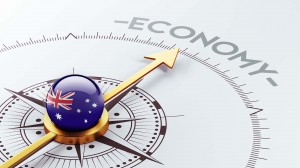Despite all the depressing news around, and at a time when the media is full of negative messages including threats of nuclear war, things appear to be looking up.
ANZ-Roy Morgan Australian Consumer Confidence edged up 0.5% to 114.1 this week, following a 3.9% rise the previous week.
The details were mixed: consumers seem less optimistic about their personal finances, though views towards economic conditions have improved.
Interestingly the Reserve Bank of Australia also feels the economy is improving.
Even though they left official interest rates unchanged at 1.5 per cent on 5 September, central bank governor Philip Lowe gave indications that monetary policy could be tightened soon.
He noted that jobs growth has improved in recent months and wages have increased in some sectors of the economy, while a gradual rise in the inflation rate is likely over the next several years.
There is now an 85 per cent chances of an interest rate rise by the end of 2018, according to financial markets.
This week's ANZ - Roy Morgan Consumer Confidence report found that:
- Households’ views towards current financial conditions slipped 2.0% last week, partially unwinding the previous 4.7% rise. Similarly, sentiment around future financial conditions fell 1.7%, following a solid 6.4% increase earlier. Despite the fall last week, confidence in overall financial conditions remains close to its long term average.
- Meanwhile, consumers’ views towards current and future economic conditions posted another solid rise (2.6% and 5.5% respectively). Even so, views towards both current and future economic conditions are running below long run averages.
- Though the weekly movement was relatively flat (-0.7%) the ‘time to buy a major household item’ index has clearly weakened after a period of strength in June and July.
- Inflation expectations eased to 4.4% (4.5% previously) on a four-week moving average basis.
ANZ’s Senior Economist, Felicity Emmett, commented:
“Though the headline number showed little change this week, the improvement in sentiment around economic conditions in the last two weeks suggests that consumers are
cautiously optimistic about the performance of the Australian economy. The Q2 GDP report later this week will provide some clarity, with the potential for the outcome to affect near-term confidence. A number of RBA speakers over the next week could also influence the debate around the outlook.
"Broadly, we believe the economy has improved somewhat in Q2, though growth remains below trend. Business conditions and confidence remain elevated and appear to be translating into stronger business spending, but weak wage growth is dampening consumer sentiment. This, in turn, is likely to weigh on household spending over the medium term and act as a constraint on the acceleration in GDP growth.”










 cautiously optimistic about the performance of the Australian economy. The Q2 GDP report later this week will provide some clarity, with the potential for the outcome to affect near-term confidence. A number of RBA speakers over the next week could also influence the debate around the outlook.
cautiously optimistic about the performance of the Australian economy. The Q2 GDP report later this week will provide some clarity, with the potential for the outcome to affect near-term confidence. A number of RBA speakers over the next week could also influence the debate around the outlook.






